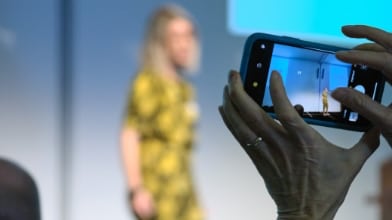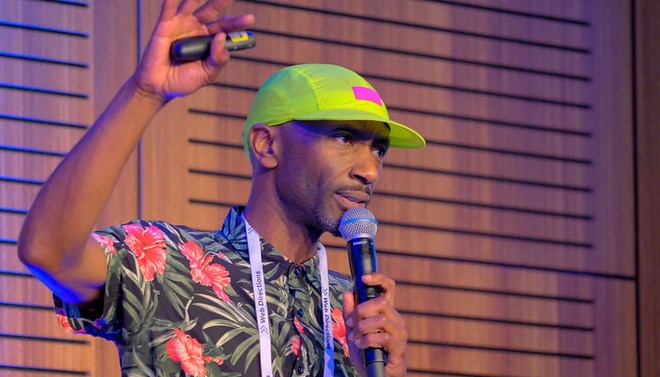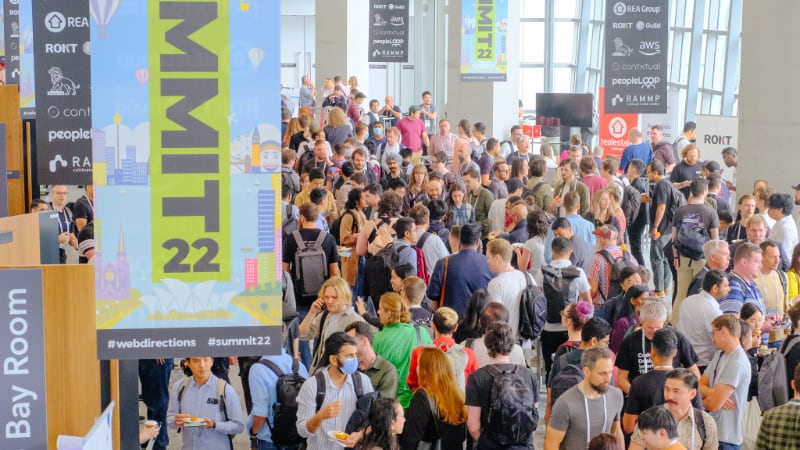Web Directions Conffab
Stream and download nearly 1,000 presentations from hundreds of world leading experts at 45 conferences…and counting
With free and paid levels, keep up to date with all that's happening in our industry at your own pace.
What's next in the world of digital design, product and strategy?

Next may be a brand-new event from us, but its DNA goes back to our earliest days.
Imagine a super concentrated day of our most engaging keynotes and talks. Opportunities to connect meaningfully with others who get excited about this stuff as much as you do.
That's Next which will help you chart what's next in product, design and strategy, and we'll be unveiling more detail soon.
Want to keep up to date with news about Web Directions Next? Let us know below and we'll email you as things develop.
If you're keen to speak at Next or one of our other events in 2023, we'd love to hear from you. CFPs are open now, closing in May.
Read all the details about what we're looking for and what we offer speakers.

Attend all four of our amazing events, across 2024, for an unbelievable price.
All Access in person Passincludes in person access to Code, Code Leaders, Next and Developer Summit.
|
All Access streaming Passincludes streaming access to Code, Code Leaders, Next and Developer Summit.
|
Next is a one day conference taking place the day after Web Directions Developer Summit.
There's also great bonuses for attending Dev Summit as a team–for each 10 team members why come along to Dev Summit, you get a bonus pass to Next. More details here.
Choose your ticketAttend or stream Next–and why not add a Dev Summit pass? Team OffersThere's great bonuses for you and your organisation when you attend as a team |
Developer Summit Gold Passincludes Next and more
|
Next Conference pass includes videos
|
Web Directions Next Conference |
|
|
Web Directions Next Videos |
|
|
Web Directions Developer Summit |
|
|
Developer Summit on demand videos |
|
|
Web Directions Next on demand videos |
|
|
12 month Conffab Pro Streaming access |
|
|
|
|
|
Keen to connect with those in the industry shaping its direction? Then Next is for you.
We work closely with our partners and their technologies to deliver world leading online conferences. Contact us totalk about how we can help you be even more awesome.
With free and paid levels, keep up to date with all that's happening in our industry at your own pace.

John Allsopp has been working on the Web for nearly 30 years. He's been responsible for innovative developer tools such as Style Master and X-Ray, and his ideas formed the foundation for Typekit, now Adobe Fonts, and the entire concept of Responsive Web Design. He's spoken at numerous conferences around the World and delivered dozens of workshops in that time as well.
His writing includes several books, including Developing With Web Standards and countless articles and tutorials in print and online publications.
His "A Dao of Web Design" published in 2000 is cited by Ethan Marcotte as a key influence in the development of Responsive Web Design, who's acclaimed article in 2010 begins by quoting John in detail, and by Jeremy Keith as "a manifesto for anyone working on the Web".
John brings his deep knowledge of and passion for the web and all things digital to every aspect of Web Directions.
Co-founded and now run by John Allsopp, Web Directions has for nearly 2 decades years brought together leading developers, engineers, visual, IxD, UX and product designers, Art and Creative Directors, product managers indeed everyone involved in producing web and digital products to learn from one another, and the World's leading experts across this vast field.
We spend our lives thinking about what comes next, keeping up with trends in technology, practices and processes, and filtering the hype, to make sure you don't miss trends that matter, and don't waste time on hype that doesn't.
We promise attending one of our events will leave you significantly better versed in the challenges you face day to day, and in solutions for addressing them.

For over a decade, we've worked hard to create inclusive, fun, inspring and safe events for the Web Industry.
As part of our commitment to these values, we've adopted a code of conduct for all involved: ourselves, our speakers, our partners and our audience.
If you have any concern or feedback, please don't hesitate to contact us.